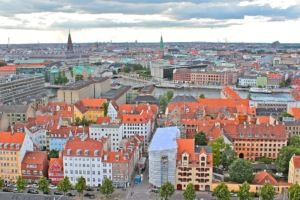News
Coronavirus Round-Up: Property prices falling a little
This article is more than 5 years old.

Your horizons are getting cheaper (photo: pxfuel)
Property prices have started to fall a little during the Coronavirus Crisis.
According to figures from Boligsiden.dk, house prices have fallen by 0.1 percent, while apartment prices have dipped by 0.8 percent over the past two months.
Summerhouses as well
Providing that spring is usually when the prices increase, the figures could be calculated to be the equivalent of 1.2 and 1.9 percent falls respectively.
Prices for summerhouses are following suit, with a 0.4 percent decrease in April. For the first time in 13 years their availability has also fallen: by almost 4 percent.
Estimation was too pessimistic
However an expert from Realkredit Danmark has told TV2 that he does not believe that the housing market has been hit as hard as feared.
In April, the Economic Council estimated that house prices could fall between 8 and 11 percent in 2020.
Most festival-goers keeping their Roskilde tickets for 2021
Roskilde Festival is delighted to announce that a significant majority are keeping their tickets for next year: more than 85 percent. Until midnight Friday the festival kept the door open for those who want a refund, and from today the reimbursed tickets will go on sale through the Roskilde Festival waiting lists.
Massive aid package to help travel industry
In light of the travel industry getting hit hard by the global crisis, a 725 million aid package has been put together by the Business Ministry. The Travel Guarantee Fund has previously been granted 1.5 billion kroner in the form of a loan from the state, which must be repaid over a number of years. Previously 80 percent of the trade association Danmarks Rejsebureau Forening’s members told TV2 that they would run into liquidity problems within one to three months.
Danes tired of working from home
As Coronavirus Crisis restrictions are gradually lifted, people are anxious to return to a normal life – and even to their normal workspace. According to a new Wilke study for A4, nearly three out of four Danes would prefer to work at their typical workplace rather than at home, which often tends to be a makeshift dining room office. Regardless, researchers predict that the coronavirus pandemic has changed the way we work and that employees will be given more work-from-home tasks in the future.
Medical Researchers: Coronavirus is here to stay
Despite the infection rate for coronavirus in Denmark falling from 0.9 to 0.7 (so every infected person on average passes the virus onto 0.7 people) since the end of April, medical researchers are warning that we will not be entirely out of the woods for likely years to come. Though the sub-1.0 infection rate indicates the spread is waning, the Norwegian Public Health Institute predicts that more infections will come in waves in October-November and in the spring of 2021 if a vaccine is not distributed in that time. Statens Serum Institut tells TV2 that it is closely monitoring the effects of the reopening of society and cannot rule out an increase in the infection rate because of these decisions as well.
Danish doctors cast doubt that COVID-19 is a respiratory disease
Danish and foreign intensive care doctors are now expressing doubt that COVID-19 can be considered a respiratory disease. In interviews with the Health Policy Journal, doctors note that while the COVID patients they have treated have formed blood clots in the veins and arteries of the lungs, blood clots have also formed in their arms, legs, and kidneys. They argue that this fact makes it as much a circulatory disease as a respiratory illness, which is an important distinction as they search for the root cause of COVID-19. Further damaging the respiratory disease classification, young COVID-19 patients do not seem to exhibit the typical lung symptoms but do show severe neurological symptoms.










































